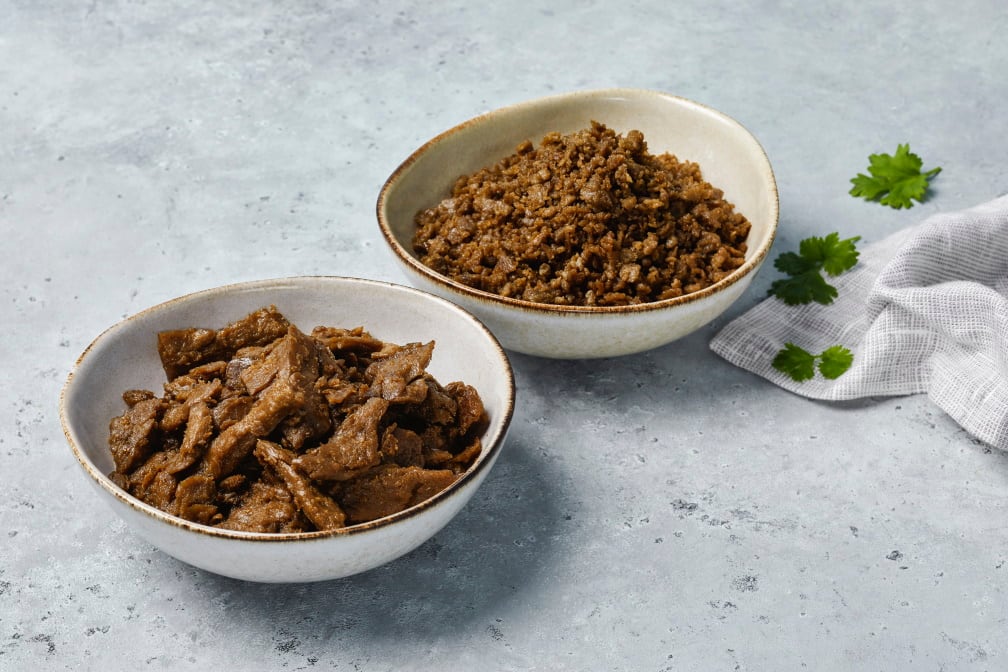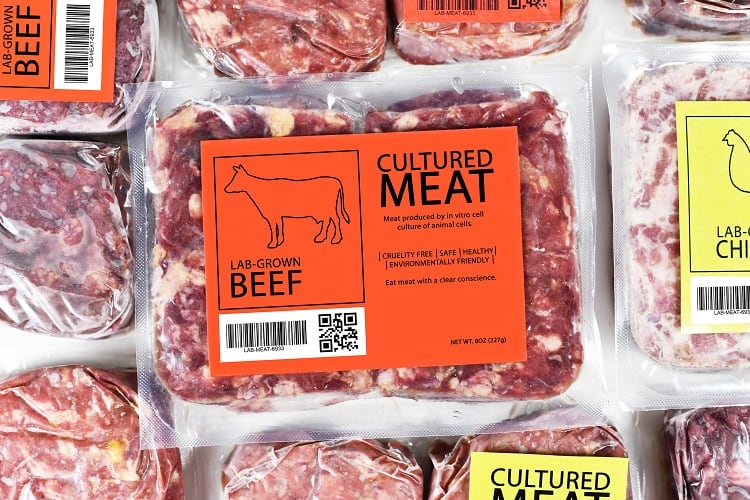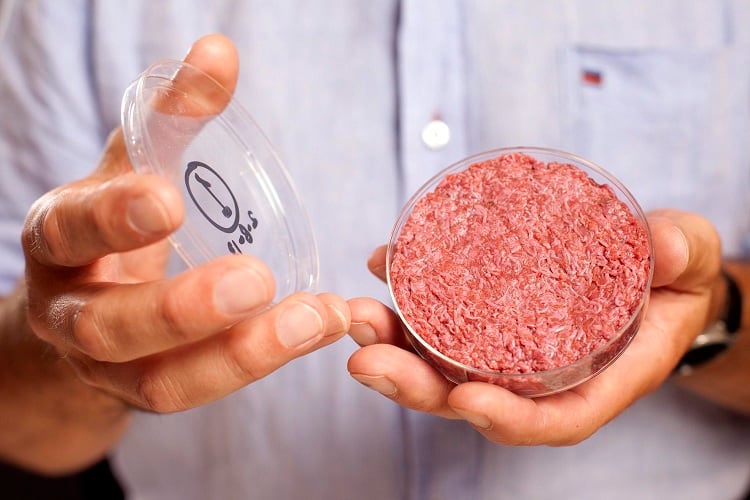Its bullish prediction came as it announced the prototype of its first commercial cultivated steak product – thin cut beef steaks -- which will be introduced at the Asia-Pacific Agri-Food Innovation Summit on 20 November in Singapore. It said this breakthrough marked a major step forward in its goal of making cultivated meat widely available globally.
Aleph plans to scale up by growing cultured meat, grown directly from non-GMO cells of a living cow in ‘large, clean’ facilities, or BioFarms, similar to a dairy facility, which it will supply to the food industry.
Aleph’s cultured process
To successfully grow whole pieces of meat, compared to minced meat product, Aleph Farms mimics the extra-cellular matrix found in animals with a plant-based matrix that enables the cells to grow and form structured tissues of meat. These ‘cell-banks’ yield an unlimited source of pluripotent, non-GMO cow cells for growing large quantities of meat without the dependency on living animals.
The company has designed patented tissue cultivators to facilitate the biological process occurring in vivo, providing the warmth and basic animal-free elements needed to build tissue in nature. This includes water, proteins, carbohydrates, fats, vitamins, and minerals.
Aleph says its process for cultivating steaks effectively mirrors the natural process of tissue regeneration processes that occur in the animal’s body, but outside of it and under controlled conditions. The process is designed to use a fraction of the resources required for raising an entire animal for meat, and without antibiotics.
It added it had ‘diligently perfected the structure of its product so that it embodies the familiar texture, taste, and cooking behavior, as well nutritional qualities of conventional slaughter-based steaks’.
One pilot BioFarm is already under construction in Israel, which will be operational by 2021. It is targeting a soft launch in 2022 with selected chefs around the world. Two years after that, it expects to have built up the infrastructure for a full launch.
Didier Toubia, Co-Founder and CEO of Aleph Farms, told FoodNavigator that when at full capacity “each of our manufacturing plants will produce hundreds to thousands of tonnes of cultivated meat per year.”
Aleph did not divulge the exact number of BioFarms it plans to build. “We are actively working on regulatory approvals and building up our supply chain,” Toubia told us.
He added the cultured meat ‘will be produced locally, where consumers live and consume it’.
“We are working hand-in-hand with the existing meat and food industry through an inclusive business model with local partners: offering a new way of producing meat as an extension line to their core business, supporting a smooth integration of slaughter-free meat into the market,” he said.
“This will not only bring production closer to the consumer and cut food miles, representing the vision for local food systems and resilient communities, but will leverage local supply chains and improve resilience, promoting food security and sustainability of operations.”
Aleph claims the steaks it grows “boast nutritional, culinary, and sensory attributes of meat in terms of texture, flavour, and aroma”.
The company adds it has developed five proprietary modules for its unique mass production platform, set to bring the product to cost parity with conventional meat at scale.
“When we reach full-scale, the cost will drop to parity thanks to significant economies of scale,” explained Toubia.
“The most expensive inputs in the cultivated meat production process are the non-animal proteins incorporated in the growth medium used to feed the cells. They are today produced in very small quantities, if at all, and in pharma grade, thus, expensive. We need infinitesimal small quantities of those proteins in our growth medium, and other similar proteins are today produced at $10kg for food, enzymes, rennet for cheese production, or consumers applications, so the potential cost reduction is validated. At Aleph Farms, we formulated a proprietary and optimized growth medium and have secured agreements with suppliers to ensure quantities and price for large-scale.”
When Aleph’s steaks are given a soft launch, they will be slightly more expensive than conventional steaks. “We believe it will reach parity quicker - probably quicker than most plant-based meat alternatives,” added Toubia.
“Aleph Farms is not in the race to be first to launch any product, but rather focused on getting the product right and on achieving cost-parity for large scale production as we believe those two goals will drive long-term acceptance and impact,” he continued.
Since announcing its proof of concept in 2018, Aleph Farms claims it has gone on to develop conditions enabling economic viability in large-scale production. In 2018, it reported that one serving of steak cost $50 to produce. It now boasts ‘a clear path for decreasing the growth medium cost 500 times at scale’.
‘A new category of meat’
Toubia, a French native, added he aims to bring gastronomic tradition to the cultivation technology. He claimed the slaughter-free product embodies the familiar texture, taste, cooking behaviour, as well as nutritional qualities of conventional steaks.
“For us, it’s not enough to just make a protein that will fill the nutritional gap; we need to capture the fullness of the meat-eating experience. We see Aleph Farms as crafters of experiences. With that said, it’s important to bear in mind that Aleph Farms is establishing a new category of meat, imbued with its own culture and a new world of meaty experiences. The transition towards focusing on quality meat, rather than fast-food and processed meats, sharpens the vision of seeing two categories of quality meat (slaughter-based and slaughter-free) targeting different consumer tribes. Very similar to white and red wine.”
Is there demand from consumers?
He is also in no doubt there is demand for cell-based meat among consumers. “Based on our consumer studies conducted around the world, acceptance to cultivated meat is popular amongst the majority of society once information is given about it. Acceptance is the highest among younger generations, meat eaters, conscious consumers about the environment and public health, but mostly among those familiar with the production method and its benefits.”
Environmental debate
The cultured meat industry is confident that it can lower the environmental footprint of meat production by reducing greenhouse gas emissions and reducing land and water use.
Critics, however, have suggested that lab-grown meat produced at scale could actually prove worse for the environment owing to the C02 released by the factories.
In response, Aleph Farms claimed to be the only company in this emerging industry to commit to carbon-neutral production in 2025 and eutrophication of its emissions throughout the entire supply chain by 2030. “This will be done while implementing a comprehensive sustainability approach that includes reduction in energy and waste, recycling of materials, use of local renewable and additional innovative and sustainable practices,” said Toubia.
He pointed out that studies based on estimations of large-scale production where a circular approach and sustainable practices were taken into consideration have concluded cultured meat production has the potential to substantially lower GHG emissions, and land and water use by more than 90% and 50% respectively.





